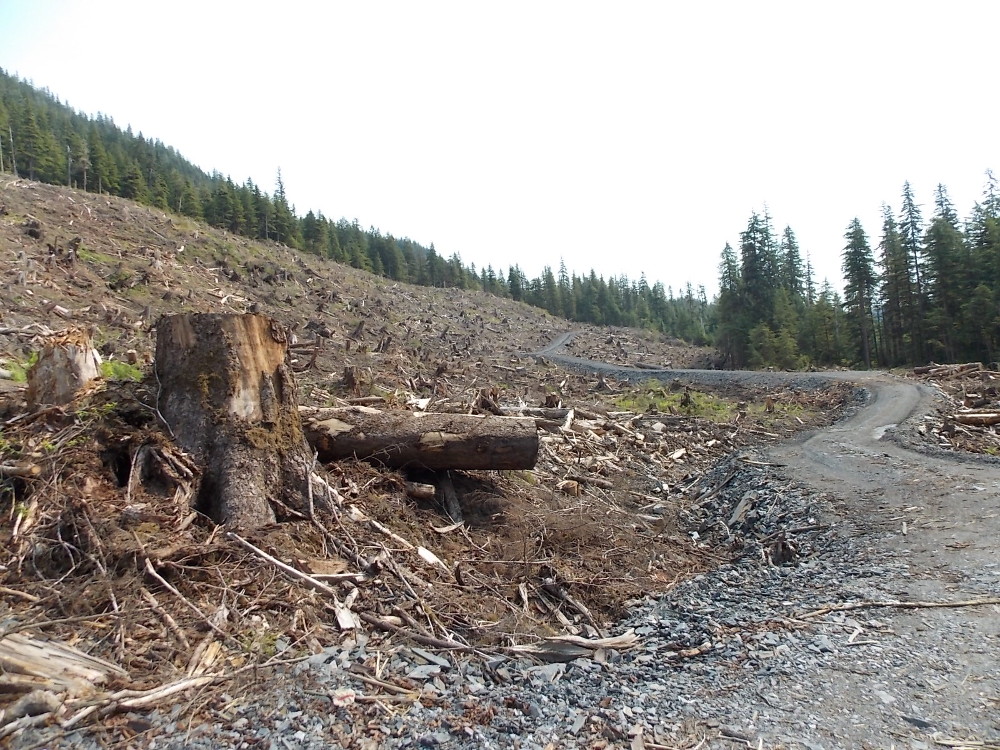
Petersburg’s borough assembly Monday voted down two different resolutions on the roadless rule and the Tongass National Forest.
The Clinton-era rule restricts road building and logging on 9.2 million acres of the Tongass National Forest that are generally not already roaded or logged. The state has asked for an exemption and the U.S. Forest Service has proposed granting that, while also considering a partial exemption or no change.
Petersburg’s mayor and vice mayor proposed competing resolutions on the controversial topic. One supports the no action alternative, alternative one, or keeping roadless protections in place. That’s been favored by most of people testifying on the topic this year in Petersburg.
Among those backing that approach were Suzanne Wood and Joe Sebastian.
“The only logical reason to open that much acreage and not increase the annual timber harvest would be to high grade the remaining top quality Sitka spruce and western red cedar for continued round log export to China,” Wood said. “Any local jobs created or economic gain for our region will probably not last long. I urge you to support alternative one.”
“The fate of these roadless lands is not a tit for tat,” Sebastian told the assembly. “We are way past this kind of exploitive thinking and the predicament we’re in now really requires some newer deeper thinking and not just our personal opinions.”
A second resolution supported the U.S. Forest Service’s alternative 6, a full exemption for the Tongass
Another local resident Bob Martin wasn’t for either resolution. He thought there were people who supported a roadless repeal and were not represented in the public testimony.
“It does seem to me like a very heavy-handed way of suppressing timber sales,” Martin said. “I think whatever the case may have been at one time the public process for opposing timber sales now is very robust.”
The assembly also heard from Trey Acteson, the CEO of the Southeast Alaska Power Agency, which sells hydroelectric power to Petersburg. Acteson was on a citizens advisory committee appointed to comment on the rule’s impacts.
“Our position has been long standing that we felt that that’s a bit of a government overreach and put an extra layer on top of our permitting process,” Acteson told the assembly by phone.
Assembly member Taylor Norheim wanted to vote down both resolutions, or support both.
“Why get involved in this?” Norheim wondered. “It’s the federal government’s doing what they’re going to do. There’s plenty of people here who can send their letters to the Forest Service instead of to us. And I just think, if we go with (alternative) one then you’re silencing the people who want (alternative) six.”
Norheim said his preference was for alternative three, which would decrease roadless protections on just over one million acres but keep logging prohibitions on key watersheds identified by conservation groups. Other alternatives considered by the federal agency offer a partial exemption or even adding to the acreage under roadless protection.
Assembly member Jeigh Stanton Gregor proposed the resolution for the no action alternative based on public input and because he thought it change would open up the forest to more export of unprocessed timber.
“Round log export is not stewardship,” Stanton Gregor said. “That’s just really the simplest way to put it. That’s not stewardship of our forest. Removing these protections right now would lead to that, there’s really no gray area to it.”
That resolution failed on a 4-3 vote with Jeff Meucci and Chelsea Tremblay joining Stanton Gregor in support of the status quo.
Meanwhile, mayor Mark Jensen proposed the resolution in favor of the full exemption.
“And I’m not in support of repeal of the roadless rule just for more timber access,” Jensen said. “The timber industry in my mind is gone. You know maybe there’s small scale logging and I think jobs are necessary. I’m worried about access to mine and potential transportation corridors in the future.”
Jensen was the only vote in favor of that resolution it failed 6-1.
The assembly could still vote on a different resolution at their second meeting this month on December 16th, the day before the comment period closes.











